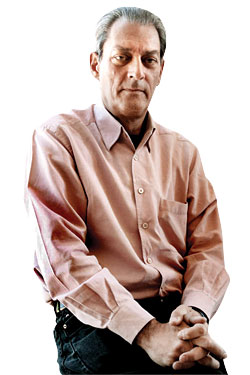
Paul Auster, 62, has just published his fifteenth novel: the well-received, extra-broody, sibling-sexy Invisible. Over two glasses of white wine at Sweet Melissa, in Park Slope—where the author has lived with his wife, writer Siri Hustvedt, since the eighties— he tells Tim Murphy that no, he’s not depressed, and isn’t into incest.
How much of Walker, the protagonist of Invisible—a handsome aspiring poet, in 1967, who is juggling a sexually sinister older European professor and a tortured French girlfriend, not to mention having a summer of sex with his own sister—is you?
He is simply not me. Every novelist uses things from his or her own life. Yes, I was in Paris in 1967. That hotel is a place I stayed. I wanted to go back and think about what it was like to be 20 again, and how ignorant we are at that age, how inexperienced, how susceptible we are.
Any other similarities?
The desire to be a writer. The interest in literature.
The brooding?
I was brooding, okay, a rather inward fellow, but not as severe as Walker. And I never had an incestuous affair with my sister.
So, yes, the incest. You depict it lovingly, as a way for these siblings to bond over the death of a third sibling.
If you want to make hierarchies about incest, this is the least malevolent form, consenting siblings. They don’t feel any guilt, really. When parents molest their children, this is brutality. But when you’re talking about two children, it’s different. It’s not as though I’m recommending that people do this. And then again: Did it happen or didn’t it?
What about Walker’s much-remarked-upon beauty? Haven’t people always commented on your own good looks?
When I was young, there were people looking at me the way people look at Walker.
As an object?
Yeah. And there’s nothing you can do about it. You’re born with your body, with your face. I never thought about it but I knew it existed. So this is a bit of a burden that Walker has to walk around with.
This book is extremely sad. Are you?
I don’t feel depressed. In fact, Walker makes a good life for himself.
He dies sad and alone.
Don’t we all?
So many men in your books seal themselves away after a divorce or the death of a loved one. Do you enact your isolation fantasies in your writing so you can be present in your life?
There’s love, and certainly children you care about more than yourself. But nevertheless, we’re alone in our heads.
You seem to really love French women. Do you love watching women ride bikes in Paris, smoking and carrying a baguette?
Young women on bicycles I find very erotic, I have to say. Even in New York, there are a lot of very attractive girls pedaling around. That just happens to be one of the nice sights in our city, seeing a young woman on a bike.
Have good intel? Send tips to intel@nymag.com.